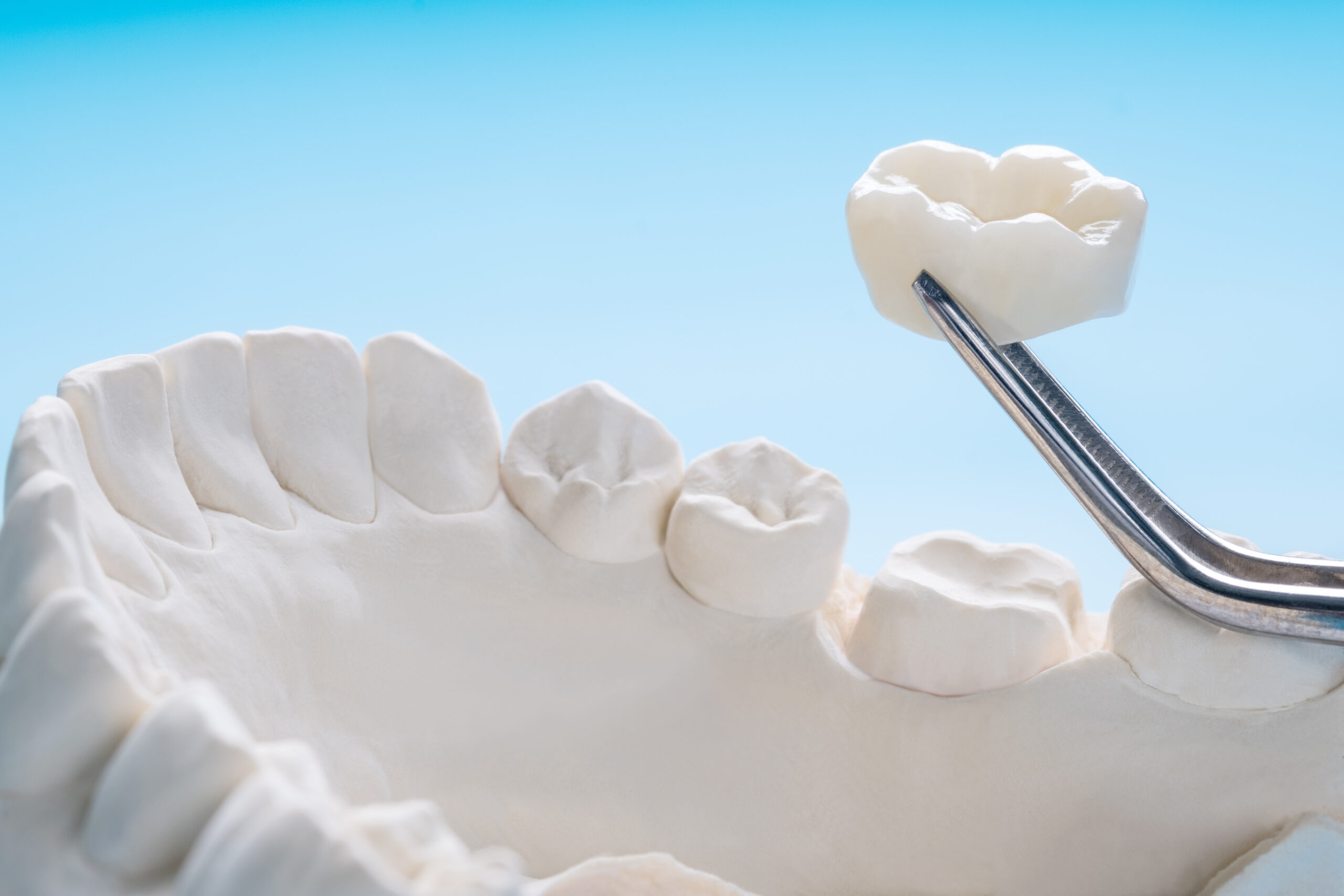Dental implants and crowns can replace or restore a tooth, respectively. These replacement options have revolutionized modern dentistry. This write-up will address all your queries about dental implants and dental crowns. Read it thoroughly to understand the differences between tooth implant vs crown.

It’s a prosthetic device placed within or above the jaw bone in place of missing teeth. Dental implants have made the lives of patients convenient and easy. They can resume regular oral functions just as they did with natural teeth.
A dental implant generally comprises of three parts:
Depending upon the type of implant, the screw is placed either within the jaw bone or above it. Then, the abutment is attached to the screw. The abutment connects the screw with the crown.
It’s a prosthetic covering for a tooth to be restored. It protects and prevents further damage to a root canal-treated or broken tooth. It is essential to understand dental crowns to understand the differences between dental implant vs crown. A tooth crown can be fabricated of ceramic or porcelain, metal, zirconia, porcelain fused to metal, gold, etc.
Each material has its specific properties. Metal crowns are cheap, zirconia crowns have amazing strength, and ceramic crowns are aesthetic. The material is chosen according to the patient’s choice, budget and the location of the involved tooth.
There is a significant difference in cost between tooth implant vs crowns.
In New Jersey, a crown costs between $350 and $1850.
On the contrary, dental implants are much more expensive than dental crowns. You can get a single-tooth implant for $1500 to $5000 in New Jersey. Price increases with the number of implants required. The material of the implant’s crown also affects the overall price of the implant.
For example, a dental implant with a zirconia crown will cost more than a dental implant with a simple ceramic or metal crown.
Both tooth implant vs crown restore regular oral functions. However, the goal of each varies.
A dental crown aims to preserve and strengthen the remaining natural tooth structure. A crown can be placed on:
On the contrary, dental implants replace a missing tooth. The space is empty and surrounded by natural teeth. If the place of a missing tooth is left empty for long, the surrounding teeth may tilt, rotate, or drift to occupy it. Moreover, specific bone changes may also take place.
If bone structure is lost, you may require additional procedures like bone grafts to initiate bone formation.
The stability of a dental crown depends on the strength of the remaining tooth structure. In addition, it is also related to the material usage. A zirconia crown possesses more strength than a ceramic crown. However, their durability is more or less the same. You can easily resume eating, chewing, and speaking after getting a dental crown. However, you should avoid eating hard and sticky food with a dental crown.
On the other hand, the strength of a dental implant is matchless and comparable with only natural teeth. If a dental expert places an implant, it is even hard to distinguish between a dental implant and a natural tooth for onlookers. With dental implants, you can chew and eat almost everything, including meat and nuts.
The lifespan of a crown is about five to fifteen years. Your oral hygiene habits correlate directly with the crown’s lifespan. A poorly maintained crown will only last for a while. On the other hand, the one you retain well by brushing, flossing, and rinsing can stay even more than five to fifteen years. Flossing after meals and before brushing your teeth prolongs the life of a dental crown. Moreover, brushing your teeth twice a day for two minutes each time is also essential.
A person who eats nuts like walnuts, almonds, pistachios, etc., and hard food items with a crown might lose it within a year. In addition, sticky food, such as candies and jellies, should be avoided. Therefore, sticking to the dentist’s instructions is essential.
The lifespan of a dental implant varies between ten to thirty or more years. Just like a dental crown, the life of a dental implant also depends directly on your oral hygiene habits. In addition to that, your nutrition also impacts its life. Healthy nutrition ensures a healthy mouth. Visiting your dentist once every six months helps detection of any complications in the beginning.
The dental crown procedure is minimally invasive. The tooth must be trimmed and brought into an ideal shape to receive the crown. It requires a maximum of about 2 to 3 appointments. When the lab has manufactured the crown, it is disinfected and cemented on the prepared tooth and tried. Patients are also called for follow-up appointments, which shouldn’t be missed.
On the other hand, dental implant procedures are invasive but painless. The gums have to be cut open to access the underlying bone. The bone is drilled to make space for the titanium screw. Rest assured that you won’t experience any pain because the procedure is performed under anesthesia. It takes about three or more appointments. The entire procedure may take about four to six months.

To sum up, both dental implants and crowns are suitable options. A dental crown preserves a healthy tooth structure. However, a tooth implant is the best option if your teeth can not be saved or if you already have a missing tooth. The main aim of both is the restorability of oral functions and regeneration of bone.
The dentists at Hesed Dental provide a personalized and budget-friendly treatment plan for you whether you opt for dental crowns or dental implants in NJ. Book your consultation today!

Hesed Dental 543 Gorge Road Cliffside Park, NJ 07010
201 941 8877